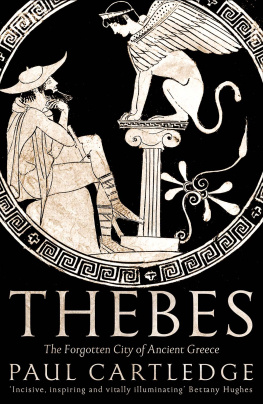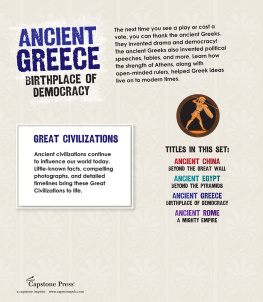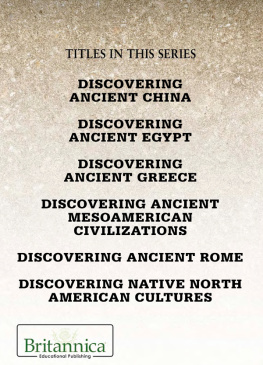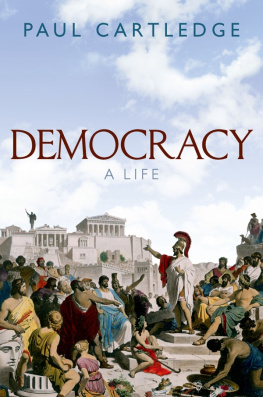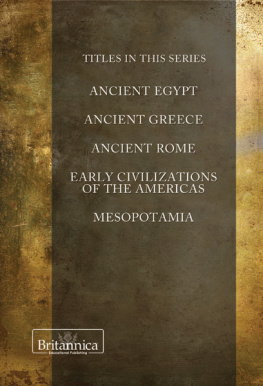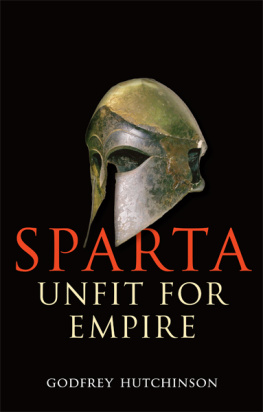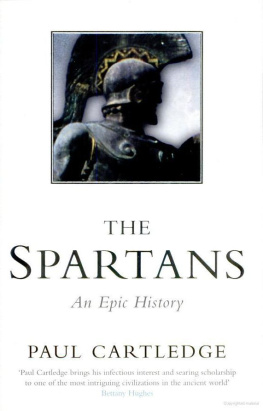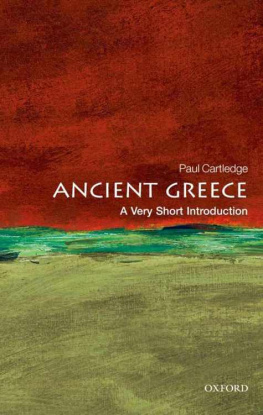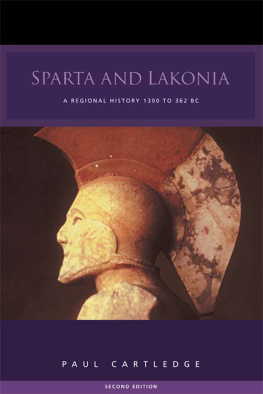Acknowledgements
Julian Alexander, my agent, and Georgina Morley, at Picador, my UK publisher/editor, are jointly most responsible for making this book happen. I am greatly in their debt, once again. The late great publisher Peter Mayer, to whom this book is dedicated (see ), was also key to its conception and development, and acceptance by its US publisher. And it has also been a pleasure to work again with Carly Tarn (formerly with Overlook, now Abrams).
Dr Carol Atack (Newnham College, Cambridge) most generously volunteered to read the whole in draft. She proved yet again to be a quite seriously demanding critic, in all the best senses. Professor Robert Garland (Colgate University), my good friend of over twenty years, at very short notice read an early, very imperfect draft of the whole book and helped me clear up many unclarities and infelicities as well as eliminate many niggling slips, all with his usual tact. Dr Daisy Dunn (editor of the Hellenic Societys ARGO magazine) likewise kindly read all at a later stage and made several helpful corrections. Professor Fiona Macintosh (St Hildas College, Oxford) helped greatly with the tragedy section and made some most helpful observations at a late stage. Professor Edith Hall (Kings College London), another dear friend and colleague of long standing, unwittingly helped me fill a couple of major gaps by showing me the manuscript of her magnificent forthcoming work (with Dr Henry Stead, Open University, UK) on Classics and class in Britain and Ireland since the late eighteenth century. My Cambridge colleague Dr Yannis Galanakis was exceptionally helpful in discussing with me his exciting excavation at Prosilio, Boeotia. Paul Lay (editor of History Today magazine) put me on to Enescus Oedipe late in the day. Finally, I have profited immeasurably from my collaboration over the past half dozen years with Professor Paul Christesen (Dartmouth College), with whom I co-direct and co-edit the Oxford History of the Archaic Greek World project.
Many years ago, I toured most of Boeotia by car with my late friend and former colleague (at the then New University of Ulster), Dr David Hardy (an alumnus of Clare College, Cambridge, at which I hold an A. G. Leventis Senior Research Fellowship). I have visited Boeotia and Thebes many times since, but that tour has stayed in my mind the most vividly.
AFTERWORD
A Tribute to Peter Mayer
E arly in the present millennium (which began in 2001) I received a phone call from New York City. It was from Peter Mayer, owner-publisher extraordinary, asking my advice on whether he should buy Duckworth. My Agesilaus and the Crisis of Sparta, which had been originally commissioned by Duckworths then owner Colin Haycraft and published in 1987, had been reissued in paperback in 2000, thanks to Colins former assistant Deborah Blake (Colin having died in 1994). Duckworths Classics list was all modesty aside altogether impressive, and Peter went ahead with the purchase.
Peter had a soft spot for English and London book publishing. He had been born in London in 1936, to a German Jewish mother and Luxemburg Jewish father. He moved to the States at the age of three, almost by chance, and graduated in English Literature from Columbia University, but returned to England to take a degree in PPE at Christ Church, Oxford, in 1954 still aged only eighteen. Between 1978 and 1997 he was chairman and CEO of the Penguin Group, Britains then largest publishers, during which tenure he took the vastly more risky decision to publish Salman Rushdies Satanic Verses and field the consequent, non-negligible death threats.
In 1971, Peter had founded, together with his father, the Overlook Press its name taken from Overlook Mountain by Woodstock in New York State. In 2007, Peter was deservedly honoured with the Poor Richard Award of the New York Center for Independent Publishers, the generous citation for which included mention of Overlooks publication of my works on ancient history as examples of Overlooks independent spirit.
One of those was my 2006 book on the battle of Thermopylae, originally commissioned by Georgina Morley for Macmillan through my agent Julian Alexander. In 2006, I was beginning my first stint as Hellenic Parliament-funded Global Distinguished Professor in the Theory and History of Democracy at New York University. Washington Square, in a building off which I both taught undergraduates and collaborated with colleagues in the Classics Department then led by Onassis Professor Phillip Mitsis, is but a few stones throws north of Wooster Street, SoHo, where Peter ruled the roost in his book-ridden, far from designer-modelled eyrie. There, and in his home loft, also in SoHo, and at the Mercer (Hotel) Kitchen, I enjoyed and profited from many an animated conversation with Peter, mainly on political and broadly cultural matters, including of course discussion of what (he insistently demanded to know) I thought he should or should not publish next. Peter was one of the most cultured as well as the most intelligent people its been my good fortune to get to know well.
Shortly before Peters death in May 2018, I was lucky enough to have one final meeting with him, in a London pub near Liverpool Street station. We discussed, of course, this present book, how best to approach and dispose it, and he followed up our drink with typically incisive email messages of support and advice. Duckworth Overlook is no more (Duckworth was sold to Prelude, Overlook to Abrams in 2018), and its Classics list had been bought earlier by Bloomsbury. Deborah Blake, who had come with Duckworth to Peters new venture from the start, exchanging one demanding boss for another, had likewise already moved on, but she, Julian Alexander and I were all in the packed congregation or rather audience for Peters showy memorial event held in Hawksmoors masterpiece, Christ Church Spitalfields in east London, on St Nicholass Day 2018. The old devil would have appreciated the tribute, but I personally was rather sorry that neither at that grand occasion nor in subsequent reportage were Peters resuscitation of and long association with Duckworth given anything like their due.
This books dedication may perhaps go some way towards correcting that imbalance: I owe Peter a very great deal, and it is with pleasure and pride tinged with considerable sadness that I dedicate this book to his memory.
Also by Paul Cartledge
THE SPARTANS
ALEXANDER THE GREAT
THERMOPYLAE
T HEBES

Paul Cartledge is A.G. Leventis Senior Research Fellow of Clare College, Cambridge, and emeritus A.G. Leventis Professor of Greek Culture in the Faculty of Classics, where he taught from 1979 to 2014. His undergraduate and doctoral qualifications were obtained at Oxford, where he completed a dissertation on the archaeology and history of early Sparta under the supervision of Professor Sir John Boardman. He is the author, co-author, editor or co-editor of well over a score of books, including The Cambridge Illustrated History of Ancient Greece; The Spartans: An Epic History; Alexander the Great: The Hunt for a New Past; Thermopylae: The Battle that Changed the World; and Democracy: A Life. He co-edits a monograph series, sits on the editorial boards of three learned journals, and serves as consultant in ancient history to publishers on both sides of the Atlantic. He is a Fellow of the Society of Antiquaries of London and an Honorary Citizen of Sparta, Greece, and holds the Gold Cross of the Order of Honour awarded by the President of the Hellenic Republic.

